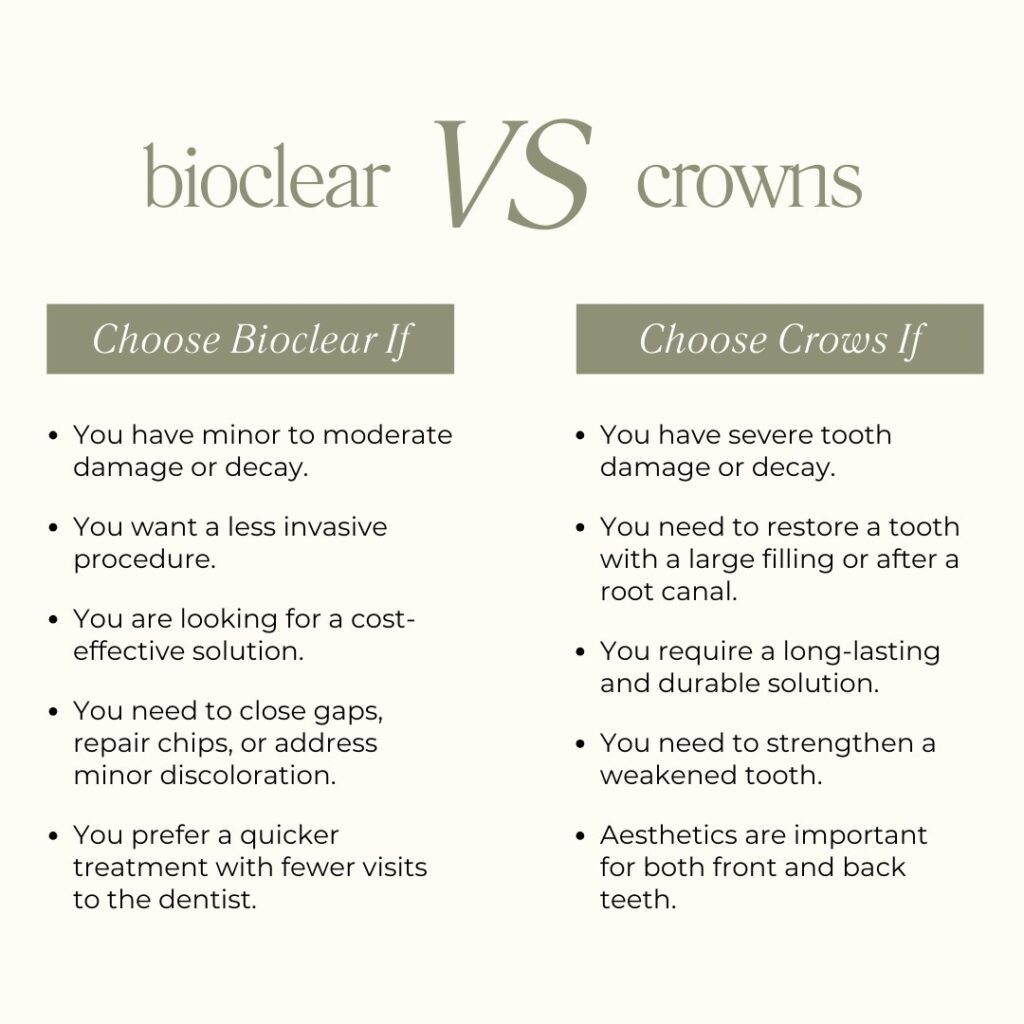When it comes to restoring a damaged or decayed tooth, you have several options, each with its own advantages and considerations. Among the most popular choices are Bioclear and dental crowns. Biological dentists help patients navigate these options to determine the best treatment for their unique situations. In this blog, we’ll explore Bioclear and crowns, comparing their costs, invasiveness, and other attributes, and providing recommendations on when to choose one over the other.
Understanding Bioclear and Crowns
Bioclear
Bioclear is a modern restorative technique that uses clear matrices and composite resin to restore teeth. It’s an innovative approach that addresses a wide range of dental issues, including gaps, chips, black triangles, discoloration, and minor decay. The procedure involves molding composite material around the tooth using a special matrix system, creating a durable and aesthetically pleasing result.
Crowns
Crowns, or caps, are custom-made restorations that cover the entire tooth. They are typically made from porcelain, ceramic, or metal, and are designed to restore function and appearance to a damaged tooth. The process involves shaping the existing tooth and then placing a fabricated crown over it, cementing it in place for long-lasting protection and support.
Side by Side Comparison
Price
- Bioclear: Generally, Bioclear is less expensive than crowns. The cost varies depending on the complexity of the procedure and the extent of the damage, but it tends to be more affordable because it requires less material and fewer visits to the dentist.
- Crowns: Crowns are typically more expensive due to the materials used and the lab work required to fabricate them. The cost can vary widely based on the type of crown (e.g., porcelain, ceramic, metal) and the specific requirements of the patient.
Invasiveness
- Bioclear: One of the key advantages of Bioclear is its minimally invasive nature. The procedure usually requires little to no removal of the natural tooth structure, preserving as much of the original tooth as possible.
- Crowns: Getting a crown is more invasive since it involves reshaping the tooth to accommodate the crown. This often means removing a significant portion of the tooth structure, which can weaken the tooth in the long term or cause a greater risk of trauma/infection to the pulp.

Durability and Longevity
- Bioclear: While Bioclear restorations are durable and can last for many years with proper care, they may not be as long-lasting as crowns, especially in cases of severe tooth damage or heavy biting forces.
- Crowns: Crowns are known for their durability and longevity, often lasting 10-15 years or more with good oral hygiene and regular dental check-ups. They provide robust protection for heavily damaged or decayed teeth.
Aesthetics
- Bioclear: Bioclear offers excellent aesthetic results, with the composite resin closely matching the natural color of the teeth. It can seamlessly blend in with the rest of your smile, making it an ideal choice for visible front teeth.
- Crowns: Crowns also offer great aesthetic results, especially porcelain and ceramic options, which can be custom-colored to match your teeth. They provide a natural look and can be indistinguishable from your natural teeth.
When to Choose Bioclear vs. Crowns
Choose Bioclear If:
- You have minor to moderate damage or decay.
- You want a less invasive procedure.
- You are looking for a cost-effective solution.
- You need to close gaps, repair chips, or address minor discoloration.
- You prefer a quicker treatment with fewer visits to the dentist.
Want to learn more about advanced dental techniques and treatments? Check out this informative article here.
Choose Crowns If:
- You have severe tooth damage or decay.
- You need to restore a tooth with a large filling or after a root canal.
- You require a long-lasting and durable solution.
- You need to strengthen a weakened tooth.
- Aesthetics are important for both front and back teeth.

Conclusion
Choosing between Bioclear and crowns depends on your specific dental needs, budget, and personal preferences. Bioclear is an excellent choice for those seeking a minimally invasive, cost-effective, and aesthetically pleasing solution for minor to moderate dental issues. On the other hand, crowns provide a durable, long-lasting option for severely damaged teeth, offering robust protection and support.
Regardless of the option you choose, it’s essential to consult with a biological dentist. Biological dentists prioritize your overall health and well-being, recommending non-metal, biocompatible materials that are safer and more harmonious with your body. This holistic approach ensures that your dental treatment supports not just your oral health, but your entire body’s health. Whether you opt for Bioclear or crowns, a biological dentist can guide you towards the best materials and procedures for your specific needs, ensuring a healthier and more natural outcome.
Still wondering which treatment is best for you? Don’t risk making the wrong decision – schedule a free consultation with Dr. Sharon Dickerson’s practice today!

